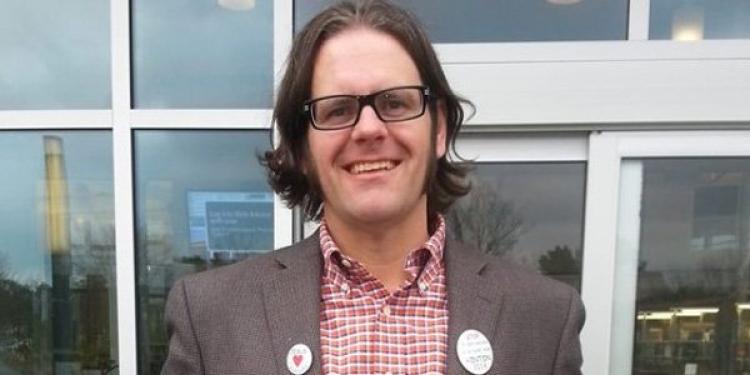Former Poker Pro James Hinton and “The Next New Deal”
Posted: October 31, 2014
Updated: June 4, 2017

James Hinton first made a splash playing online poker. Now he’s making a new name for himself by shaking up the political establishment.
James Hinton of Napa California is fed up. Fed up with the slowly eroding standard of living of the middle class in America, fed up with the arrogance of Wall Street, fed up with a Washington political establishment that lacks the will or inclination to rise above the interests of powerful donors.
He’s fed up with a US Congress that has forgotten that it was elected to represent the man on the street, not the men on Wall Street. So he decided to do something about. James Hinton is running for Congress. And he’s doing it using a powerful platform of economic populism he calls “The Next New Deal.”
Who is James Hinton?
• James Hinton played online poker professionally before Black Friday
• He is running for US Congress as an independent
• His bold reform program is called “The Next New Deal”
Mr. Hinton hails from Napa, California, on the opposite coast from the “corridor of power” running from New York City to Washington, D.C. The son of blue-collar parents, he is as far from the East Coast establishment as one can get.
While most federal legislators spend their twenties interning at prestigious law firms or powerful federal agencies, Hinton opted to play online poker in America professionally.
He was a very successful poker pro, but his career came to an abrupt end in 2010 with the coming of “Black Friday,” the fateful when federal authorities cracked down on internet poker and indicted the operators of PokerStars and Full Tilt Poker.
Black Friday taught Hinton about the dangers of government power harnessed for the wrong purposes. His experience as a poker pro taught him some lessons about America: many of the brightest, most capable people aren’t in the limelight but are all around us, and anyone can be successful if they have the determination to put their talents to use.
Hinton is optimistic by nature, seeing America’s greatness in people, not power. But he sees this greatness being stifled by an unholy alliance of Wall Street greed and Washington corruption, a system which funnels money away from the working public and into the hands of well-connected bureaucrats.
The Next New Deal
Hinton is a left-wing populist in the traditional sense, a man who believes that economic forces should be harnessed to serve the 99%, not the 1%. That’s what inspired his ambitious reform platform, “The Next New Deal.”
His humble origins and lack of political experience means he can’t be compared to Franklin Delano Roosevelt, but he invokes the historic champion of the American working class when he heralds The Next New Deal to be “the fulfillment of FDR’s vision, fueled by the 1-2 economic punch of a 1% Wall Street Sales Tax and the de-privatization of the Federal Reserve.”
Like all populists his campaign is heavy on the fire and brimstone, but he has come up with some carefully-crafted policy proposals as well. Firstly, he plans to help lift America out of recession with a $5 trillion infrastructure development fund.
By investing in America’s crumbling roads, bridges, schools, hospitals, and utilities, Hinton hopes the fund can “give America the demand we need now for good jobs, and the basis for sustained economic growth in the 21st century.”
How does he plan to pay for this? By instituting a 1% tax on all financial transactions, a measure which he believes will kill two birds with one stone by raising tax revenue and disincentivizing the risky trading that puts the financial security of all Americans at risk.
With this revenue he believes that he can “roll back all austerity measures” as well as provide tax relief to working and middle class families and individuals making up to $60,000 annually.
The most ambitious part of “The Next New Deal” is its plan to “de-privatize” the Federal Reserve, greatly expanding its mandate from steward of the money supply to supplier of “low or no interest credit” to American households and businesses.
A populist approach to business
This fiery rhetoric about harnessing economic forces for the public interest may cause some to believe that Hinton is anti-business, but that’s far from the case. He favors private ownership and reasonable regulation.
However, The Next New Deal differentiates the real economy (“productive business, from the largest firms down to local restaurants, repair shops and drycleaners”) from the financial sector (“zombie banks and hedge funds who steal the wealth we produce”).
Hinton wants the Federal Reserve to supply near zero interest loans to all businesses operating in the real economy, and believes that the lower cost of capital will enable businesses to pay “$15 per hour for all workers.”
Sizing up Hinton’s chances
James Hinton’s days of making gambling news are long gone, but can he make news at the polls on November 4th? His opponent is Mike Thompson, a career politician backed by $1.6 million of Democratic Party funds.
Running as an independent means Hinton has both sides of aisle united in trying to bring him down. But as a man who has put up his own money to take a chance on the American people, he’s hoping that those same people will take a chance on him too.
Whether one agrees with Hinton’s reform program or not, he has proven that a former poker is capable of speaking truth to power in a way that few others can.














